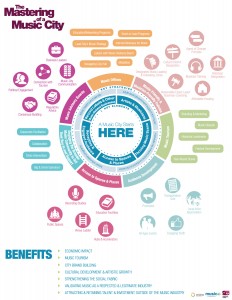From Friday July 10th, new music releases will be made available for fans to enjoy on the same day across the world, as the switchover is made to “New Music Fridays”.
Until now, tracks and albums have been released on different days of the week in different countries – from Mondays in markets such as France and the UK, through Tuesdays in the US and Canada and to Fridays in markets such as Australia and Germany.
The change means that fans can now get new music on the same day worldwide rather than having to wait for their own national release day. It replaces the patchwork of national release days which meant fans were frustrated and unable to access music in their own country when it was legally available elsewhere.
The switchover to “New Music Fridays” is being implemented by labels, retailers and artists internationally and will establish an aligned global release day in more than 45 countries.
Frances Moore, chief executive of IFPI, said: “The switch to New Music Fridays is about getting new music to fans at the time they most want to enjoy it, whether in physical stores or online. It’s also an opportunity to recreate excitement around the release of music – the message is “Think Friday, Think New Music.”
Fans, industry professionals and anyone else looking for information on the switch to a Friday release day can visit www.newmusicfridays.com which has all the details of the changes taking place.
The first “New Music Friday” worldwide
There are several albums being released on the first “New Music Friday” including Years & Years’ Communion (Polydor), Owl City’s Mobile Orchestra (Republic), Little Boots’ Working Girl (Repeat Records), R5’s Sometime Last Night (Disney), Veruca Salt’s Ghost Notes (El Camino) and Kidz Bop’s Kidz Bop 29 (Razor & Tie).
Singles releases in key markets include Little Mix’s Black Magic (Syco) and Nick Jonas’ Chains (Island) in the UK and Taio Cruz’s Do What You Like (Island).
A worldwide switchover
“New Music Fridays” will be established in more than 45 recorded music markets worldwide.. Of these, 11 countries already release music on Fridays, while the others will switch the day that new albums and singles become available.
The switch to global “New Music Fridays” has been overseen by an international steering group made up of the following organisations:
- IFPI, representing some 1,300 record labels worldwide;
- WIN-Impala, representing independent record labels worldwide;
- FIM, representing musicians’ unions and associations globally;
- Featured Artists Coalition representing UK performers;
- Entertainment Retailers Association (ERA) (UK);
- Music Biz (US).
Consumer research
Independent research suggests that music fans wanted new music to be available at the start of the weekend. Consumer research by TNS across seven markets[1] shows Friday and Saturday as the preferred days for new music release among consumers who expressed an opinion. More than two-thirds of those with a preference (68%) chose Friday or Saturday.
Charts move into line
The move to New Music Fridays will also lead to many countries making changes to their charts as well. Public music charts in most countries reflect a week’s sales, so changing the release day to Friday means changing the chart week as well. For example, in the UK the BBC will launch its first Friday chart show, having moved it from Sundays, and in France the TV station D17 will be moving its weekly featuring the latest charts from Tuesday to Friday.
Statements on Global Release Day
Kim Bayley, chief executive, Entertainment Retailers Association:
“Retailers and digital services are the ultimate link in the chain between artists and music fans. Having a single worldwide release day reduces customer confusion about when new music is available and focuses everyone’s attention on new releases. Retailers are working hard to implement the change to Fridays and ensure that the advent of New Music Friday is a success.”
James Donio, president, Music Business Association (Music Biz)
“The Music Business Association (Music Biz) is committed to working with our members and industry partners in the United States to make a smooth and successful transition to New Music Fridays.”
Frances Moore, Chief Executive of IFPI
“The switch to New Music Fridays is about getting new music to fans at the time they most want to enjoy it, whether that be in physical stores or online. It’s also an opportunity to recreate excitement around the release of music – the message is “Think Friday, Think New Music. The global release day also helps artists, labels and retailers by limiting the time between releases in different countries and thus narrowing the gap on piracy. The move made today has been a great example of cross-sector cooperation, involving labels, artists, retailers and others across more than 45 markets.”
Paul Pacifico, chief executive, Featured Artists Coalition (FAC)
“The FAC welcomes any initiative that brings artists and fans closer together and the Global Release Day does just that, making sure that all fans, wherever they are in the world, can get legal access to new tracks as soon as they are released. Making Global Release Day Friday brings the additional excitement of launching major new releases in the run-up to the weekend.”
John Smith, president, International Federation of Musicians (FIM)
“FIM fully supports the move to New Music Fridays. Our industry, our membership and our audiences are increasingly global, and a move to a global release Friday offers an exciting opportunity to release music at a time when people most want to listen to and buy it.”
[1] January 2015 – TNS survey of 7251 consumers across seven markets: Brazil, France, Italy, Malaysia, Spain, Sweden and USA. 4201 consumers expressed an opinion/ preference for a release day.



 Today, the IFPI released the
Today, the IFPI released the
Music Canada